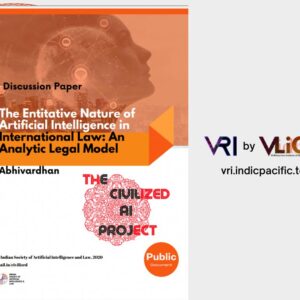This work is licensed under Creative Commons Attribution-NonCommercial-NoDerivatives 4.0 International ![]()
The advent of Artificial Intelligence (AI) in the realm of space exploration and maintenance has genuinely ushered in a new phase of technological sophistication and efficiency.
AI-driven predictive maintenance for spacecraft epitomises this advancement, promising to substantially enhance the reliability, safety, and longevity of space missions. This transformative potential of AI might revolutionise the way we approach space exploration and maintenance, enabling more ambitious, efficient, and scientifically productive missions.

Nevertheless, the integration of AI in predictive maintenance for spacecraft presents a novel and complex challenge to existing legal frameworks and ethical considerations. Traditional legal instruments, such as the Outer Space Treaty and the Liability Convention, were conceived in an era prior to the advent of sophisticated AI technologies, rendering them potentially inadequate to address the unique legal and ethical nuances of AI-driven activities in space.
This gap in the legal landscape raises critical questions regarding liability, jurisdiction, and the formulation of new legal standards to govern the deployment and operation of AI in space. The autonomous nature of AI systems further complicates the attribution of responsibility for actions taken in space, as these systems can operate independently and make decisions based on their own algorithms and training data. This poses substantial challenges in determining accountability and assigning liability in the event of AI-related incidents, accidents, or unintended consequences.
Moreover, AI use in predictive maintenance for spacecraft introduces additional layers of complexity, as these systems rely on vast expanses of data and sophisticated algorithms to anticipate and prevent potential failures. The collection, processing, and storage of this data raise concerns about data privacy, security, and ownership, as well as the potential for technical bias and discrimination in AI decision-making processes.
To begin with, this report explores the use cases of artificial intelligence in predictive maintenance for spacecraft and epitomises the specific use cases that are addressed in this report. Then, as a generic legal estimation of the outer space legal literature is provided, the report offers case studies of successful AI use cases in predictive maintenance in the outer space.
To keep the scope of this technical report specific, we have proposed soft law approaches, which may be productively helpful for the space industry, and government space agencies to consider, instead of adopting top-down international law treaties or protocols around the original Outer Space Treaties.
| IndoPacific.App Identifier | IPLR-IG-009 |
|---|---|
| ISBN/ISSN | |
| Author(s) | |
| Publisher | |
| Publication Type | Digital |


![Regulatory Sandboxes for Artificial Intelligence: Techno-Legal Approaches for India [ISAIL-TR-002]](https://indopacific.app/wp-content/uploads/2023/02/hjfgdertfy-IPLR-Gmail-ADMIN-300x300.jpeg)
Already on VLiGTA? Log in
Having trouble logging in? Learner help center
This site is protected by reCAPTCHA Enterprise and the Google Privacy Policy and Terms of Service apply.